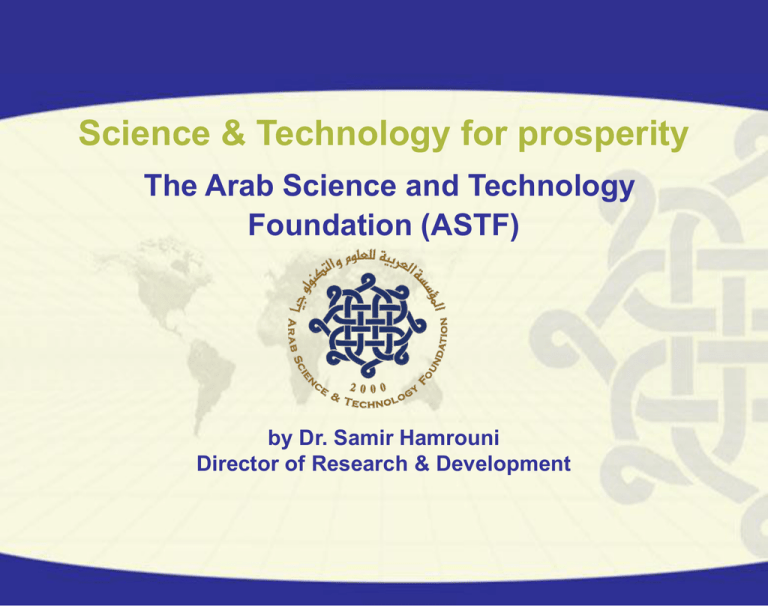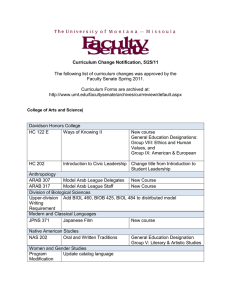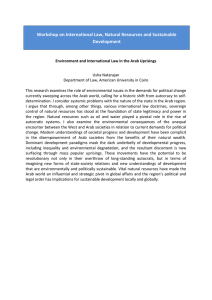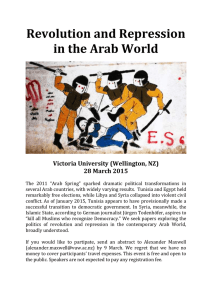Science & Technology for prosperity The Arab Science and Technology Foundation (ASTF)
advertisement

Science & Technology for prosperity The Arab Science and Technology Foundation (ASTF) by Dr. Samir Hamrouni Director of Research & Development What has ASTF Done? • Networking S&T Community – – – – • Biennial symposium (SRO1- 4), Database & e-PR program, Networking Website, Iraqi S&T community Collaborative Research – Virtual Research Centers – Solar Water Desalination Project • Fund Innovative R&D – 1st pan-Arab merit-based Research Grant program, – ASTF- IFS (Stockholm) on “ Young Scientist Fund” program. • Investment in Technology – Bi-annual “Investing in Technology Forum”, – Establishment of 1st Arab Early Stage VC. What has ASTF Done? • Networking S&T Community – – – – • Establishing 5 Networks to Promote Science & Scientists. Organized 37 Scientific Events. Co-Organized 28 Scientific Events. Events conducted in 11 Arab Countries involving scientists from around the globe. Collaborative Research – Virtual RC on Solar Water Desalination $ 11.2 M with Libyan fund. What has ASTF Done? • Fund Innovative R&D – 828 Proposals Received. – 250 International reviewers participated from 30 countries in Asia, Europe, North and South America and North Africa. – 107 Projects Funded. – Topics of Funded Projects: Material Science, Water, Energy, Biotechnology, Information & Communication Technology, Food Sciences, Marine & Aquatic, Health, Agriculture & Animal Sciences, Environment, Electrical & Electronic, Mechanics & Construction, Meteorology and Remote Sensing, Chemical Industries & Petrochemicals, Drugs & Medicines, Intelligent Systems & Robotics, Radiation Safely. – $3.7 million Total fund. – 504 beneficiaries (researchers and staff) from 14 Arab Countries. What has ASTF Done? • Investment in Technology – – – – Network of 500 Arab technopreneurs and investors. 40 Startups supported. 22 Received Independent Funding. 4 Investing in Technology Forums with more than 400 participants from more than 200 organizations. – 3 regional Awards & Competitions Program. – Working on Establishing 1 st Arab Seed VC Fund. 06.06.06 07.07.07 08.08.08 09.09.09 …… Quo vadis, Science & Technology in Arab World? Towards a values-based knowledge society THE ARAB SCIENCE & TECHNOLOGY PROGRAM “IZDIHAR” (Prosperity) Objectives ◘ To solve: “IZDIHAR” is conceived to help to solve problems and to answer to society needs and to the major socio-economic challenges facing the Arab region. ◘ To integrate: This first pan-Arab program helps to integrate all the capacities of the Arab science and technology system and to integrate science and technology in Arab economy. ◘ To create knowledge: to build the value-based knowledge society in the Arab world Towards a Values –based knowledge society in The Arab World-Arab Science And Technology Program (5X5=1) IZDIHAR (prosperity) T O – To solve problems and to answer to market and society needs for sustainable development and employment creation by the implementation of trans-national and multidisciplinary collaborative scientific research and technological development – To maximize their impact by combining technological, industrial, social and cultural aspects. MUJTAMA’ HAYAT MA'LUMA NUMUW BEE'A S (Life) (Information) (Development) (Environment) O Agriculture food and nutrition L V E Decision Making Economic integration IC Technologies Health Biotechnology (Society) Application and integration of technologies Nanotechnologies Environment technologies Good governance Education New materials Energy Production technologies Sustainable development Trends and changes in society Citizenship Values and knowledge TO INTEGRATE all the elements of the Arab Science and Technology system SHABAKA (Network) For research networking and researchers' mobility. IBDA‘ (Innovation) To transform knowledge into products and services. MULKIYA (Proprietorship) For technology transfer and the management of intellectual property and patents. ISTITHMAR (Investment) To create the suitable environment to promote investment in technology. SHARAAKA (Partnership) To support research in SMEs and entrepreneurship. Thematic Areas ◘ HAYAT: (Life) It’s the programme of life sciences and technologies. It includes three thematic programmes: - Agriculture, food & nutrition: To face the growing demand for safer, healthier and higher quality food and for sustainable use and production of renewable bio-resources. To meet the growing demands for safer, healthier and higher quality food and for sustainable use and production of renewable bio-resources. Research will also focus on the role of nutrition in promoting and sustaining health. - Health: To improve the competitiveness of Arab health-related industries and business by transforming basic discoveries in clinical applications, developing new therapies, diagnostic tools and technologies. - Biotechnology: taking into account post-genomic research, to enable real progress at Arab level in medicine (data generation, standardisation, acquisition and analysis) and improve the quality of food (control food-related risk) Thematic Areas ◘ MA’LUMA (Information) This is the area of Information and Communication Technologies. It Comprises two thematic programmes: – Technologies: to stimulate the development in Arab countries of both hardware and software technologies in order to increase the competitiveness of Arab industries – Application and integration of technologies: to make ICT meet societal challenges and allow Arab citizens the possibility of benefiting fully from these technologies. Thematic Areas ◘ NUMUW (Development) This program aims to promote competitive and sustainable growth of Arab industry. Industry’s role will not only be to identify areas of collaboration but also to bring together and integrate projects. NUMUW includes three thematic programmes: – Nanotechnologies: to achieve a critical mass of Arab capacities (form public research to companies) to develop and exploit this field. – New materials: to generate innovative (new and improved) materials and their technologies for production and transformation – Production technologies and processes: to integrate the new generated results from nanotechnologies and new materials in various fields (industrial, agricultural, medical, desalination of water, etc.). Thematic Areas ◘ BEE’A (Environment) The program is intended to strengthen the scientific and technological capacities needed and to coordinate a pan-Arab approach for a sustainable management of the environment and its resources. The thematic programmes are three: – Environment: To focus on environmental technologies to provide economic and efficient solutions to local specific needs and to strengthen Arab position in this technologies market. – Energy: To contribute to cleaner and more sustainable energy systems (including renewable) and economic and efficient energy for a competitive Arab region. – Sustainable Development: to focus on sustainable management and quality of water and sustainable management of Arab' land and marine resources. Thematic Areas ◘ MUJTAMA’ (Society)-1- The program is established to support the fact that the Arab region has witnessed the need for reform/transition (the cost of non reform is extremely high) in the economic and social spheres. - Decision-making: Encourage the establishment of advisory groups and think-tanks regarding the main operational areas facing problems which impede social and economic development. The Arab world lacks reference documents (reports) associated with the social development and economic growth in strategic areas. - Economic Integration: Analyse some negative aspects of Arab economies: (lack of regional integration, fragmentation of the markets, fragility of the financial and monetary sector, widespread weakness of the sector of services, etc.). - Good governance: Explore and support the development of good governance forms to encourage societal change in areas such as Arab knowledge-based society, regional integration and effective policy making process. Thematic Areas ◘ MUJTAMA’ (Society)-2- - Education: Analyse the role of education in labour market changes and the relationship between education and employment and school-to-work transition. Research will also analyse the capacity of education and training to prepare individuals over their lifetime to a changing environment. - Trends and changes in society: Taking into account Arab regional - - diversities, to analyse the profound structural and social changes and to provide knowledge on the interactions between societal trends, changes in family structures, life chances and cultural patterns and value systems. Citizenship: Provide innovative and integrated analyses on changing concepts and practices of citizenship. Research will focus on the study of social movements, citizens’ initiatives and gender to promote citizens’ participation in the policy making. Values and knowledge: Analyse the influence of the various components of cultural, educational and socio-economic models on the development of values to formulate transitions strategies towards a values-based knowledge society. Towards a Values –based knowledge society in The Arab World-Arab Science And Technology Program (5X5=1) IZDIHAR (prosperity) T O – To solve problems and to answer to market and society needs for sustainable development and employment creation by the implementation of trans-national and multidisciplinary collaborative scientific research and technological development – To maximize their impact by combining technological, industrial, social and cultural aspects. MUJTAMA’ S HAYAT MA'LUMA NUMUW BEE'A (Society) (Life) (Information) (Development) (Environment) Decision Making Economic integration O L V E Agriculture food and nutrition IC Technologies Health Biotechnology Application and integration of technologies Nanotechnologies Environment technologies New materials Energy Production technologies Sustainable development Good governance Education Trends and changes in society Citizenship Values and knowledge TO INTEGRATE all the elements of the Arab Science and Technology system SHABAKA (Network) For research networking and researchers' mobility. IBDA‘ (Innovation) To transform knowledge into products and services. MULKIYA (Proprietorship) For technology transfer and the management of intellectual property and patents. ISTITHMAR (Investment) To create the suitable environment to promote investment in technology. SHARAAKA (Partnership) To support research in SMEs and entrepreneurship. Horizontal Activities All the activities included in this chapter aim to integrate all the capacities of the Arab science and technology system and to integrate science and technology in Arab economy. Horizontal Activities ◘SHABAKA (Network) – Arab science and technology observatory: To elaborate Science and Technology indicators and database, to support Science and Technology foresight and both to analyse current situation and to identify long term trends and thus to guide decision making. – Networks: To integrate the research capacities of participants and to strengthen scientific and technological excellence on a particular topic. – Researchers’ mobility and training: To develop and transfer research competencies and knowledge (from outside to inside and inside to inside) to help to the consolidation and widening of researchers' career prospects, and the promotion of excellence in the Arab S&T system. – Women researchers: To involve women more actively in the Arab S&T System by disseminating information, training actions, networking activities, monitoring progress (a set of gender indicators), campaigns and awarenessraising initiatives. – Young researchers: To help and provide training, mobility and career development opportunities to young scientists. – Science and society: To give Science and Technology a higher profile in the media and education, to centre S&T activities around society needs and to strengthen the ethical basis of these activities. Horizontal Activities ◘ IBDA’ (Innovation) – Technology transfer: To improve the economic and social impact of research activities by ensuring the better dissemination of results and to support cooperation programmes between organisations from academia and industry, in particular SMEs. – Innovation: To set up the basis for an Arab innovation system by promoting a legal framework, networking capacities and promoting trans-national exchange of experience and the set up of technology businesses in the region. Horizontal Activities ◘ MULKIYA (Proprietorship) – Intellectual property: To offer on-line information, training, consultation and support on protection rules and intellectual property and to collaborate in the long-term project for the creation of the Arab Patents office. Horizontal Activities ASTF Investing In Technology Initiative (ITI) Networking Arab Technopreneurs Network Arab Technopreneurs Portal Investing In Technology Forum Funding Recognition & Awareness Regional Business Plan Competitions Regional Recognition Awards Top 25 TV Program (Successful Arab Technopreneurs) Capacity Building Angel Investors Group Global Startup Program VC Fund Matchmaking & Strategic Partnership Linkage Introductory Workshops Mentoring Program Horizontal Activities ◘ SHARAAKA (Partnership) ◘ Industry-academia partnership: To support cooperation between public research centres and SMEs through joint research partnership. ◘ SMEs participation: To encourage SMEs participation. A predetermined percentage of the whole program (“Izdihar”) budget relating to the five thematic areas will be allocated to SMEs. ◘ Entrepreneurship: To provide a wide array of services to Arab Technology entrepreneurs, which includes assistance in developing business plans, assistance in patents and Intellectual Property, assistance in funding and assistance in technology commercializing. Strengthening Arab Science through partnership benefits all of us. Building strong Scientific Program improves the Arab Community and increases our mutual understanding. Thank You sh@astf.net www.astf.net


